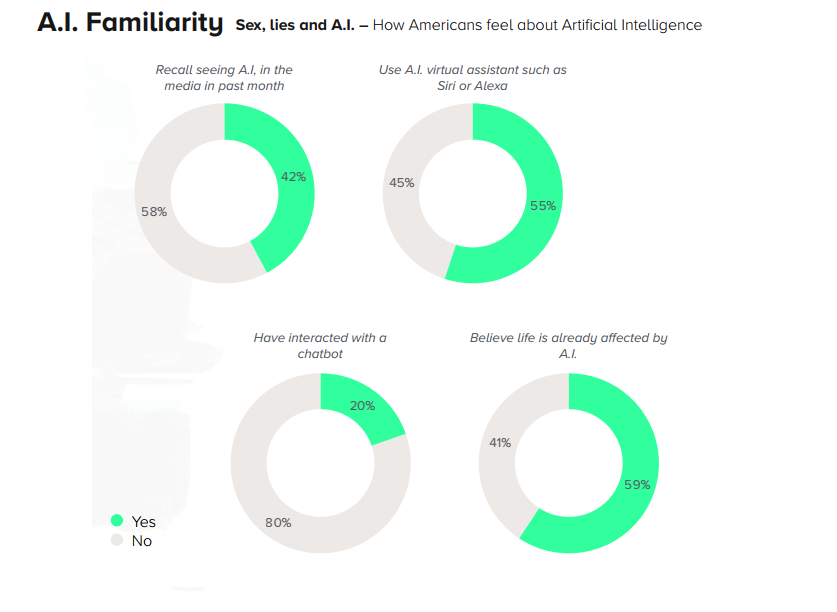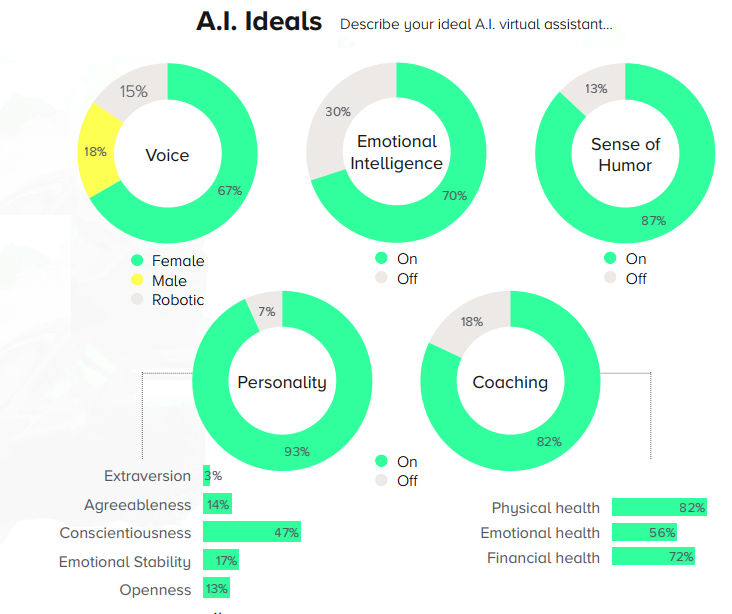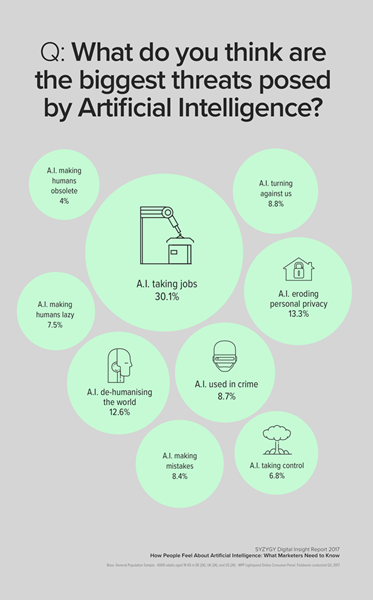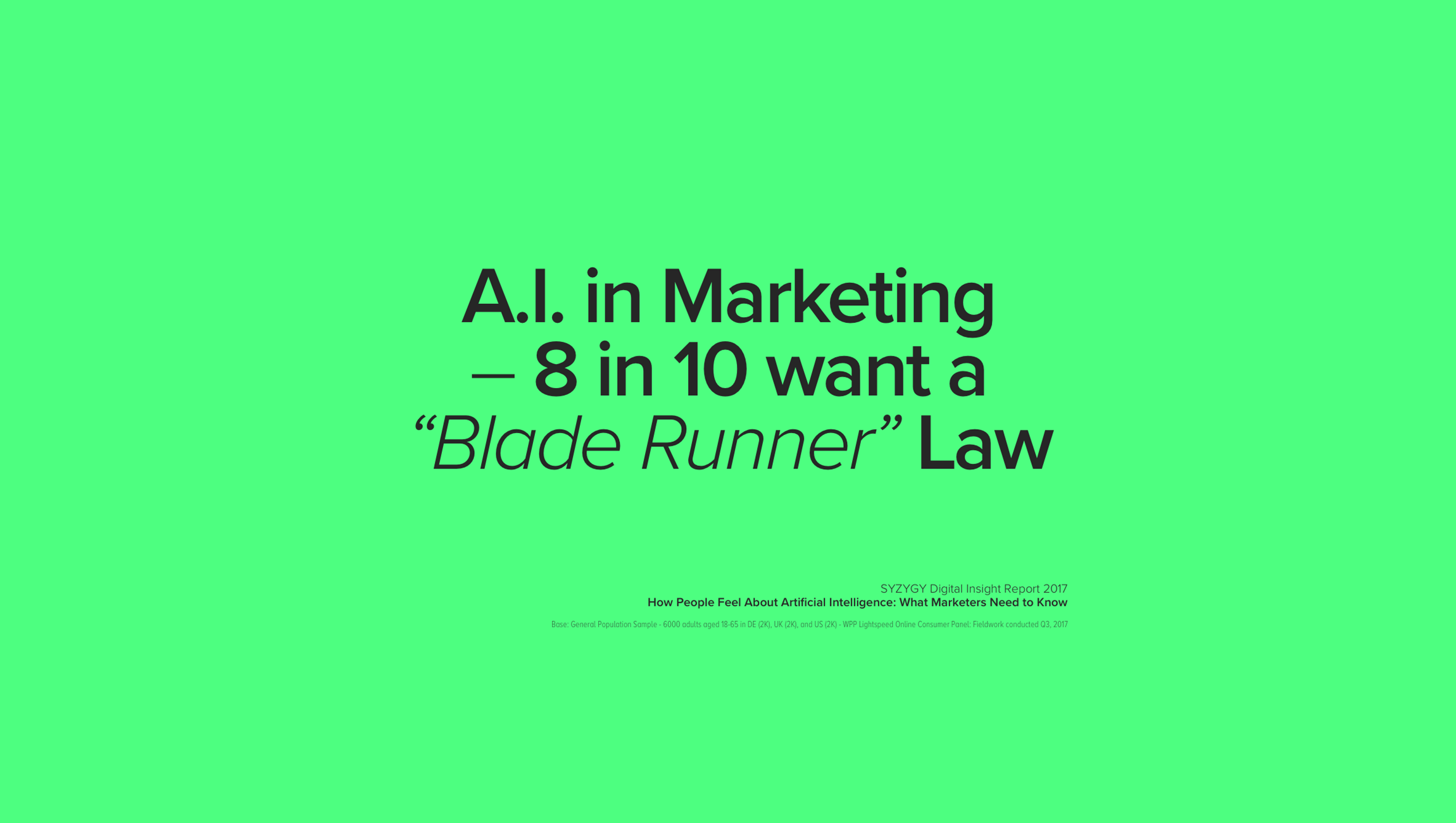In A Recent Syzygy Report, 79% Of Americans Believe The Use Of AI In Marketing Should Be Regulated By A “Blade Runner” Rule
As Blade Runner 2049 hits movie theatres, new research by SYZYGY (a WPP digital agency group) shows that concerns about artificial intelligence (AI) are top of mind for American consumers. Research titled “Sex, Lies and A.I.” from SYZYGY reveals that 79% of Americans believe a new “Blade Runner rule” is needed to make it illegal for AI applications such as social media bots, chatbots, and virtual assistants to conceal their identity and pose as humans.
The study, “Sex, Lies and AI: How the American Public Feels About Artificial Intelligence” was conducted in Q3, 2017 with 2000 American adults aged 18-65 years from the WPP Lightspeed Consumer Panel.
AI versus Human Service: How use of Artificial Intelligence Impacts Sentiment
Interestingly, 89% of Americans believe that the use of AI in marketing should be regulated with a legally-binding code of conduct and almost three-quarters (71%) think that brands should need their explicit consent before using AI when marketing to them.
Megan Harris, Managing Director, SYZYGY North America, said, “This is a human-centric study designed to uncover people’s positive and negative feelings about AI. As the advertising and marketing industry expands its use of AI and develops more AI-powered technology solutions, we need to collectively develop ethical and operational guidance grounded in the attitudes, values and fears of the consumer.”
- 71% of Americans think brands should have consent before using AI to market to them
- 28% would feel negatively towards their favorite brand if they discovered it was using AI instead of humans for customer service
Impact of AI Usage
Feelings towards AI being used in advertising were more neutral. Only 21% of respondents would feel negatively if they discovered the latest ad for their favorite brand was created by AI rather than humans, compared with 28% who would feel more negatively towards their favorite brand if they discovered it was using AI instead of humans to offer customer service and support. This rises to a third (32%) among women.
Meanwhile, 21% would feel more negatively towards their favorite brand if they discovered it had been using AI in their marketing campaigns to profile them.
AI Understanding Still Limited
Only 11% of Americans say they know a lot about AI. When asked to choose from among 17 words that describe their feelings towards AI, “interested” was the top descriptor, given by 45% of US respondents. Close behind was “concerned” (41%), “skeptical” (40%), “unsure” (39%) and “suspicious” (30%). Most Americans expect that AI will have benefits, saving them time (40%) and making things safer (15%) and more useful (13%).

What an Ideal AI-assistant Should Feel Like
A first in many ways, the report clearly outlines what Americans expect from their interaction with the AI-assistant. 70% of them want the AI-assistant to demonstrate emotional intelligence; 87% anticipate a sense of humor; 93% want the virtual assistants to exhibit a combination of extraversion, emotional stability, openness, and agreeableness.

Job Transformation vs. Job Loss
Almost a third of people (30%) most fear that AI will replace jobs. Americans believe that over the next five years, a machine could take over 36% of their individual job duties (this rises to 44% among Millennials).
Marketing AI Rule Book
However, if brands use it fairly and transparently, consumers aren’t completely averse to them using AI to market products and services: as many as 79% would not object to AI being used to profile and target them in marketing.

SYZYGY has defined a Marketing A.I Rule Book, with guidelines as follows –
Do no harm – AI technology should not be used to deceive, manipulate or in any other way harm the well-being of marketing audiences.
Build trust – AI should be used to build rather than erode trust in marketing. This means using AI to improve marketing transparency, honesty and fairness, and to eliminate false, manipulative or deceptive content.
Do not conceal – AI systems should not conceal their identity or pose as humans in interactions with marketing audiences.
Be helpful – AI in marketing should be put to the service of marketing audiences by helping people make better purchase decisions based on their genuine needs through the provision of clear, truthful and unbiased information.
Dr. Paul Marsden, SYZYGY’s consumer psychologist who managed the study, added: “This research reveals how consumers are conflicted when it comes to AI. Many see advantages, but there are underlying fears based on whether this technology or the organizations behind it have their best interests at heart. Brands need to be sensitive to how people feel about this new technology. What we need is a human-first, not technology-first approach to the deployment of AI.”











